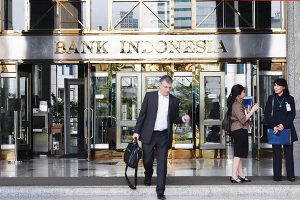Bloomberg
Indonesia’s central bank kept its borrowing costs unchanged to support economic growth, while signalling it wasn’t in a hurry to join the global interest-rate tightening cycle given muted domestic price gains.
Bank Indonesia left the seven-day reverse repurchase rate at a record low 3.5% on Thursday, as predicted by 22 of 36 economists in a Bloomberg survey. The rest expected policy makers to deliver a 25 basis-point hike.
The country’s benchmark stock index closed 0.15% lower, while the rupiah extended losses to 0.3% at 15,033 against the dollar after Governor Perry Warjiyo cited within-target core inflation to justify the case for continuing with the easy policy.
By opting to buck the US Federal Reserve-led policy tightening rush, Bank Indonesia is showing that not all need to take the same approach to fighting inflation. Southeast Asia’s biggest economy, which is also the world’s largest palm oil exporter, has the fiscal room to to cope with supply-driven price pressures, thanks to a windfall from commodity exports, and a relatively resilient currency.
Although the rupiah has been among the least volatile in the region, Warjiyo said BI will stabilize the currency through interventions in spot and forward markets after it touched the 15,000 level against the dollar, the weakest since 2020.
On headline inflation breaching the central bank’s 2%-4% target range, he said it will return to target next year, while pointing that price gains in the core measure tracked by the central bank will remain within range.
The governor said the central bank sees the economy expanding more towards the lower end of a 4.5%-5.3% outlook range, as he flagged risks to global growth.
“We were actually harboring the hope that some tightening might come into place by now,†said Wellian Wiranto, economist at Oversea-Chinese Banking Corp in Singapore, who expects 75 basis points of hikes from BI this year. “We still see a good chance of the rate hike to come next month, with inflation likely to pick up once again on food and fuel price upticks.â€
Bank Indonesia has been using tools other than interest rates to normalize monetary policy settings. Governor Warjiyo reiterated raising the reserve requirement ratio gradually to absorb excess liquidity, with 219 trillion rupiah ($14.6 billion) absorbed so far. The bank has planned more government bond sales to mop up excessive money from the financial system.
Still, keeping borrowing costs lower will boost credit demand in the economy, supporting its recovery from the pandemic. June loan growth was at 10.7% from a year ago, Warjiyo said, while urging banks to step up lending activity.
 The Gulf Time Newspaper One of the finest business newspapers in the UAE brought to you by our professional writers and editors.
The Gulf Time Newspaper One of the finest business newspapers in the UAE brought to you by our professional writers and editors.
